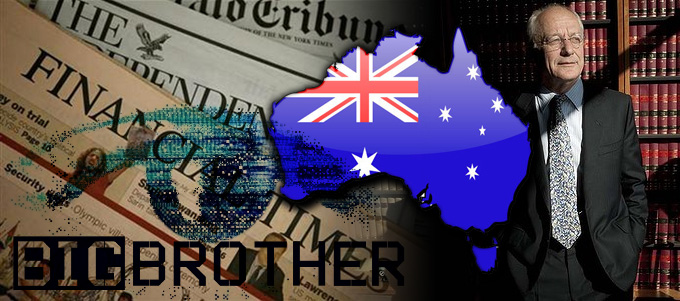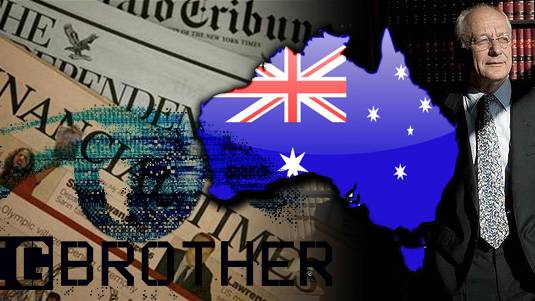"News Media Council" - Big Brother’s Media Watchdog Threatens Freedom of Speech in Australia
Source: theaustralian.com.au

The independent Media Inquiry commissioned last year by the federal government has proposed the creation of a national watchdog that would keep watch on the conduct of all media outlets in Australia - print, broadcast and online.
See video here: Media inquiry calls for single watchdog
According to Inquiry chair Ray Finkelstein, establishing a state media eye that will be funded by the national government would hopefully improve the media profession’s professional and ethical practices.
With a state regulator that would be empowered to bring erring media firms to courts, journalists are expected to perform "their roles skilfully and diligently," Finkelstein said.
The new state body, should it materialise, would be called the News Media Council and would draw a yearly budget of $2 million from Canberra, the inquiry report said, which Communications Minister Stephen released on Friday.
Senator Conroy’s office had indicated that the Finkelstein report was submitted to him Wednesday.
"News Media Council should have power to require a news media outlet to publish an apology, correction or retraction, or afford a person a right to reply," the review panel recommended on its report.
That tool would be exercised via court-enhanced power of the media council, Finkelstein said, which effectively would separate it from the existing authority of the Australian Press Council (APC), presently the industry-funded body that hears and handles media-related issues.
The media review noted that the APC was largely ineffective in addressing problems that involve media conducts and stressed "there must be some effective means of raising standards of journalism and of making the media publicly accountable."
"What the media have lost sight of is that they accepted the idea of press regulation by having set up the APC to make a positive contribution to the development of journalistic standards," the report added.
With the creation of the media council, which will be duly backed by federal legislation, the report looks forward to speedy resolution of complaints and issues that would be brought against specific media practitioners.
Apart from superseding the functions of APC, the News Media Council will assume regulatory responsibility of the Australian Communications and Media Authority (ACMA), which currently keeps a watchful eye on Australia’s broadcast industry.
Online news sites will also be targeted for regulation in the new super body, the panel report said, but websites with over 15,000 hits a year will be the first to attract regulatory attention, which include personal blogging sites that deal with Australian affairs.
The industry immediately raised concerns on the broad powers that will be enjoyed by the media regulator, with News Ltd chief executive Kim Williams cautioning that "the spectre of a government-funded overseer of a free press in an open and forward-looking democracy like ours cannot be justified."
"There is no role for government to be involved in regulation that adjudicates on whether or not reporting is fair and balanced," Williams told The Herald Sun on Friday.
"If print and online media are to continue to be able to robustly question, challenge and keep governments in check, they must remain self-regulated entirely independent of government," the News Ltd boss said.
Also, opposition communications spokesman Malcolm Turnbull warned that the proposed statutory media regulation would only replicate the presumably effective self-regulatory practices of the local media industry.
Turnbull noted too that while the review highlighted valid concerns, the idea of a wider scope of regulation to hang over the media industry might not be a necessary measure at all.
"If the unregulated part of the media is more balanced than the regulated part, why do you conclude that more regulation is the answer," Turnbull was quoted as saying by The Australian.
Prime Minister Julia Gillard launched the inquiry last year in the immediate aftermath of the hacking scandal that led to the closure of the century-old ’News of the World’, a London-based tabloid ran by Rupert Murdoch’s News Ltd.
ibtimes.com
Media fears for freedom as watchdog unleashed
Print and online news will come under direct federal government oversight for the first time under proposals issued yesterday to create a statutory regulator with the power to prosecute media companies in the courts.
The historic change to media law would break with tradition by using government funds to replace an industry council that acts on complaints, in a move fiercely opposed by companies as a threat to the freedom of the press.
The proposals, issued yesterday by Communications Minister Stephen Conroy, also seek to widen the scope of federal oversight to cover print, online, radio and TV within a single regulator for the first time.
Bloggers and other online authors would also be captured by a regime applying to any news site that gets more than 15,000 hits a year, a benchmark labelled "seriously dopey" by one site operator.
The head of the review, former Federal Court judge Ray Finkelstein, rejected industry warnings against setting up a new regulator under federal law with funding from government.
The major newspaper companies were unanimous in opposing a statutory regulator under federal law, with Kerry Stokes’s Seven West Media declaring it was inconsistent with the notion of a free press.
Media companies also warned that government funding for the new regulator would undercut the workings of a healthy democracy, with APN News & Media bluntly opposing any increase in regulation.
But the Finkelstein review found flaws in the way complaints about newspapers were handled by the Australian Press Council, which has four staff funded by the industry to adjudicate on disputes.
The review concluded that a new regulator empowered by federal legislation would give complainants a faster way to seek redress such as corrections, clarifications or apologies.
"There must be some effective means of raising standards of journalism and of making the media publicly accountable," the report said. "What the media have lost sight of is that they accepted the idea of press regulation by having set up the APC to make a positive contribution to the development of journalistic standards.
Mr Finkelstein and his colleague on the review, former journalist Matthew Ricketson of the University of Canberra, acknowledged the danger of creating a new law as a check on the print and online media.
"The real objection to statutory backing is about how the power might be misused in the future - that, even if the law when originally enacted does not interfere with press freedom, inevitably the law will soon change to have that effect."
Yet the review concluded that its proposed News Media Council would have the power under the law to act on complaints about news and current affairs in print, online, radio and TV.
The report calls for "secure funding" from Canberra to pay for the News Media Council and suggests about $2 million a year, twice the budget of the Australian Press Council.
"News Media Council should have power to require a news media outlet to publish an apology, correction or retraction, or afford a person a right to reply," the report states. It says this would be enforced through the courts.
The council would absorb the supervision of radio and TV current affairs by Canberra’s existing regulator, the Australian Communications and Media Authority, which ran the "cash for comment" investigation into talkback radio over many years.
The council would scrutinise online news sites that get more than 15,000 hits a year, clearing the way for government-funded action against amateur website operators who comment on news and current affairs. Greg Jericho, a prominent Canberra blogger on national politics, said: "The level of 15,000 hits a year, or about 40 hits a day, is seriously dopey."
Some media executives privately dubbed the News Media Council as a potential "star chamber" because it would not have to give reasons for its decisions, which would not be subject to appeal.
There was some relief, however, that the Finkelstein review did not call for the new regulator to have the right to levy fines on media companies.
The recommendations feed into a wider Gillard government media Convergence Review that is tipped to lead to reforms to ownership laws later this year.
Senator Conroy made no comment on the findings, which he received on Wednesday, other than to say the government would take a "considered approach" to the results in conjunction with the Convergence Review.
Opposition communications spokesman Malcolm Turnbull praised the report but noted that it was born out of a "spiteful effort" by the Gillard government to "have a crack" at News Limited, publisher of The Weekend Australian.
Mr Turnbull questioned the report’s assumption that a statutory regulator could do a better job than industry self-regulation when there were so many complaints about talk-back radio even though it was overseen by ACMA.
"If the unregulated part of the media is more balanced than the regulated part, why do you conclude that more regulation is the answer?" Mr Turnbull said.
Greens leader Bob Brown urged the government to establish its new media watchdog so it could enforce standards across print, online, radio and television platforms by the end of the year.
While Fairfax Media said it would comment on the report "in the coming days", the company’s submission to the Finkelstein inquiry objected to compulsory membership of a media regulator in a statutory scheme.
News Limited chief executive Kim Williams welcomed the report as a substantial work but spoke strongly against the concept of a government regulator.
"The spectre of a government-funded overseer of a free press in an open and forward-looking democracy like ours cannot be justified," Mr Williams said.
"If print and online media are to continue to be able to robustly question, challenge and keep governments in check, they must remain self-regulated entirely independent of government."
Source: theaustralian.com.au






















